Play a science-fiction mini-game from Dark City Games
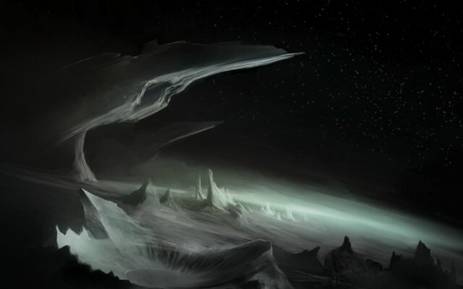
To promote their new science-fiction role-playing game At Empire’s End, Dark City Games has created S.O.S, a short solitaire SF role-playing game. We’re pleased to reprint the game in its entirety here on the Black Gate blog.
You can either read the text as choose-your-own-adventure style paragraphs, or grab some dice and play according to the short rules. Experienced role players, or those familiar with The Fantasy Trip, should be able to jump right into the action.
Without further ado, we present S.O.S, a Legends of Time and Space science-fiction role-playing adventure by George Dew.
You come out of hyperspace around the barren, rocky, waste-planet of Lemm. It orbits a distant star, and lacks an atmosphere. As a result, the inhospitable grey surface boasts temperatures hundreds of degrees below zero.
Your sensors scan for traces of the distress signal, when suddenly, an alien contact flashes across your navigation screen. Do you want to hail it (001) or attack with initiative (002)?
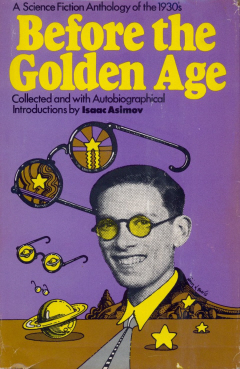 Kim Patrick Weiss, of Bavaria, Germany, writes:
Kim Patrick Weiss, of Bavaria, Germany, writes: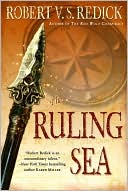 Right now, I’m about a quarter of the way into
Right now, I’m about a quarter of the way into 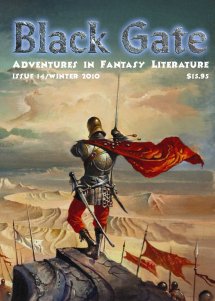 Author Sherwood Smith, who has reviewed virtually every issue of Black Gate, shares her thoughts on our
Author Sherwood Smith, who has reviewed virtually every issue of Black Gate, shares her thoughts on our  I have a friend who collects Star Wars paraphernalia. He travels around the country a few times a year attending mammoth SciFi conventions and comic trade shows, in the frenzied remainder of the hunting and gathering instinct that evolution allowed us to keep. The dedicated room in his house where this amazing assortment of merchandise is displayed has its own security system, in place at the request of the insurance company that covers it with a policy of biblical proportion. His Facebook page is a plethora of friends and fans who admire his every acquisition, seeking to purchase or swap rare treasures with their original packaging intact.
I have a friend who collects Star Wars paraphernalia. He travels around the country a few times a year attending mammoth SciFi conventions and comic trade shows, in the frenzied remainder of the hunting and gathering instinct that evolution allowed us to keep. The dedicated room in his house where this amazing assortment of merchandise is displayed has its own security system, in place at the request of the insurance company that covers it with a policy of biblical proportion. His Facebook page is a plethora of friends and fans who admire his every acquisition, seeking to purchase or swap rare treasures with their original packaging intact.
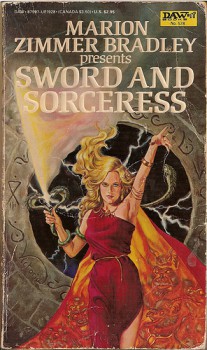 Sword and Sorceress I
Sword and Sorceress I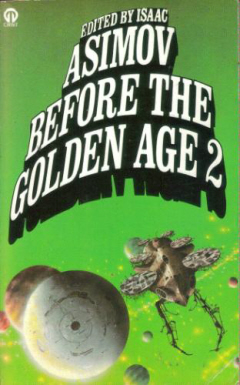 One of my favorite books — among a host of many favorites, of course, many many favorites, collected over decades of careful reading in a wide variety of genres, it’s hard to choose, depends on the time of day, naturally, and what we’re talking about, whether you want to include non-fiction, and it’s difficult to judge pleasure reading against, you know, literature like The Sound and the Fury, which was great until the part where I quit reading and pretty much gave up. That Quentin character though, man, what a dick. Anyway. Where was I.
One of my favorite books — among a host of many favorites, of course, many many favorites, collected over decades of careful reading in a wide variety of genres, it’s hard to choose, depends on the time of day, naturally, and what we’re talking about, whether you want to include non-fiction, and it’s difficult to judge pleasure reading against, you know, literature like The Sound and the Fury, which was great until the part where I quit reading and pretty much gave up. That Quentin character though, man, what a dick. Anyway. Where was I. I’ve been pondering the need for heroes in fiction again this week, and I thought it a good time to revisit a post I’d made on the Black Gate Livejournal page a few years ago. I imagine a lot of you haven’t read it; if you have, I apologize for the repeat.
I’ve been pondering the need for heroes in fiction again this week, and I thought it a good time to revisit a post I’d made on the Black Gate Livejournal page a few years ago. I imagine a lot of you haven’t read it; if you have, I apologize for the repeat.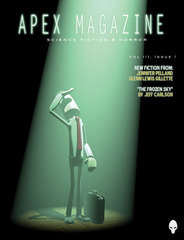 Apex publisher Jason Sizemore has announced that the magazine has re-opened to submissions.
Apex publisher Jason Sizemore has announced that the magazine has re-opened to submissions.